Walk through Chettinad’s bustling lanes, and you will be welcomed by heritage mansions featuring intricate handiwork, ponds with lotus blooms, and ancient temples with ornate facades. The region once helmed by the Nattukottai Chettiars, was known for its opulence in every realm: architecture, culinary heritage, art and craft, and more.
While only 11,000 mansions remain today (half of what existed 50 years ago), with a majority in ruins, Chettinad yearns for a revival. Which is why a few individuals working on projects designed to highlight the region’s riches: from cultural festivals to large-scale hospitality ventures, there is a lot happening in Chettinad today, away from the public eye.
We bring you a lowdown of what makes the region perhaps the next big cultural revival project in the country.
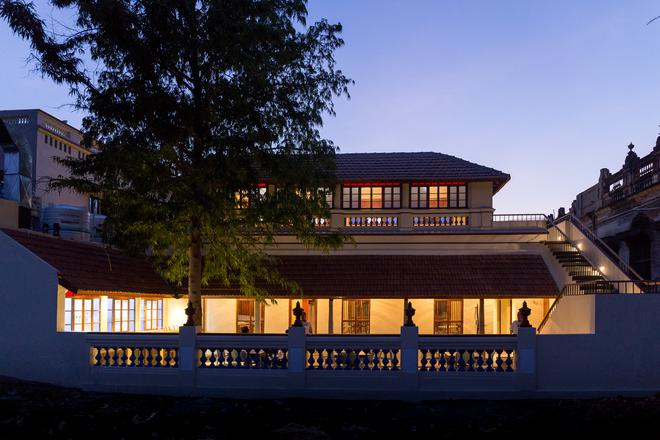
Mansions turn boutique hotels
In the town of Kanadukathan today, a flurry of workers are transforming a construction site into a heritage hotel. Helmed by Priya Paul, chairperson, Apeejay Surrendra Park Hotels, the project (kickstarted in late 2021) will see the heritage property being converted into 15 luxury suites, with a new swimming pool, restaurant, and a private lounge. “We are not only restoring the palace, but also ensuring that when we do up new spaces, we make them even more spacious for the contemporary traveller,” says Priya, who first visited Karaikudi 20 years ago and was charmed by the region’s history and art.
Elaborating on the promise the region holds for a hospitality venture of this scale, she explains how, over the years, there has been an increased interest in Chettinad’s unique architecture, design as well as cuisine.
“The villages in the region have been well-preserved, making it an ideal location to get an immersive experience. It is also close to temple towns such as Tanjore and Madurai, and an ideal stopover while driving to Puducherry which is just two hours away. For tourists who have an interest in art and architecture, as well as spiritual tourism, this region definitely holds a lot of promise,” says Priya, who also runs The Vaadhyar’s House, a boutique cafe in Kanadukathan, which has been operational in a 150-year-old summer home since September 2018.
Meenakshi Meiyappan of The Bangala, explains how the annual Chettinad Heritage and Cultural Festival’s 2023 edition supported by the State government — set to begin this month — will have 10 mansions open for public viewing, as compared to four from last year. However, she believes locals are still reluctant to open up their homes. “Most aren’t co-operative as a lot of effort goes into cleaning the mansions for public viewing, and also because they need to be present the entire day for visitors. But we’ve still managed to get a few homes for viewing this year.”
This is why alongside Priya’s venture — that joins the ranks of The Bangala, Chidambara Vilas, Vilasam, and other luxury properties — it is heartening to witness a surge in private individuals investing in the region. Take for instance Vayal, a two-bedroom homestay in Sakkottai (about 25 minutes east of Karaikudi) that opened its doors this January. While it is owned by a young architect couple who built it as a vacation home, the property is now managed by LuxUnlock Private Villa Experiences, a luxury villa rental company based in Chennai.
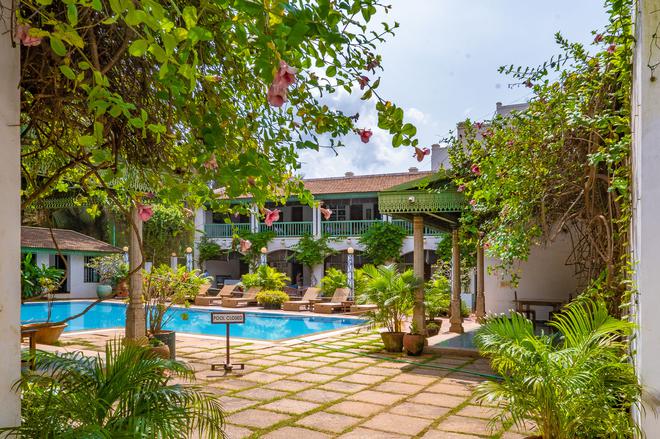
“I have always been deeply drawn to Chettinad’s heritage and art. Almost all our itineraries include Chettinad as one of the must-see destinations,” says Ashish Gupta, managing director, LuxUnlock, who has also been a part of several luxury travel companies such as Travel To Care and Milesworth Journeys.
Amidst a 3.5-acre organic farm that is part paddy field and part mango orchard, Vayal was constructed in 2019 as a family retreat to escape the chaos of urban life. “It was also built to serve as a separate contemporary home when the family congregated at the ancestral family mansion in their village of Sakkottai for festivals and special occasions,” says Ashish.
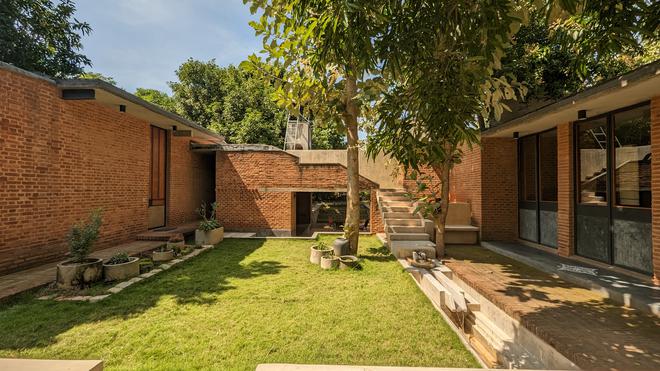
As the architects and their family used the house infrequently, they decided to open it to “travellers with a passion for architecture and design, to enjoy this unique home, and be able to experience the sheer delight of slow life,” says Ashish who decided to take up the project because “Vayal plays a very important strategic role for our company. Our larger mandate is to develop underserved tourism destinations in South India through the low-impact homestay and villa model. There is currently inadequate accommodation infrastructure in Chettinad, with just four to five small hotels and just under 100 rooms. Homestays can easily add to the overall inventory with very little capital outlays.”
Sarath Selvanathan, who runs the popular artisanal nose ornament brand Mookuthi, recalls spending his summer vacations at his ancestral home in Patharakudi, one of the 73 villages in Chettinad, attending the April thiruvizha with his cousins.
“My forefathers worked as accountants to the Chettiars, and my family also built the Mariappan temple in Ho Chi Minh City, Vietnam,” he says, adding how he grew up listening to these stories. “I want to be the keeper of these stories, and would like to convert the village into a living museum.” Today, Sarath is on a mission to showcase his culture and retell these stories from the South. Not just through his jewellery (his latest collection is inspired by Chettinad) but perhaps a hospitality project.
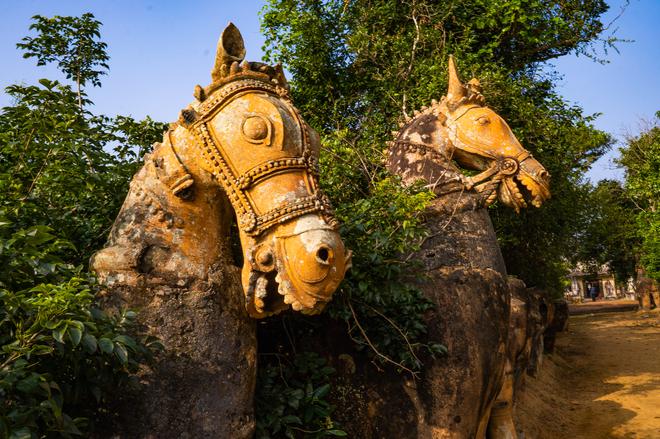
Built in 1945, Sarath’s ancestral home has undergone several renovations and comprises four rooms. “Every year, we go to the village in February for Shivratri and in April for the thiruvizha. It is owned by my father and his three brothers. At present, a hospitality venture seems natural for the family,” says Sarath, whose latest collection at Mookuthi is named Athangudi, as it celebrates the vibrant colours and patterns of the region’s tiles.
Artists lead the way
A decade ago, noted photographer Amar Ramesh left his IT job in the US and moved to India “to document the history and stories of the ancient temples of Tamil Nadu”. “With a camera in my hand, I began traveling across the State and discovered that in addition to temple architecture, I was keen to document its varied art and culture,” says Amar, who has recently initiated a project called Discover Tamil Nadu to spotlight the State’s vibrant culture, art, and architecture. “Recently, we formed a collaboration with SPI Edge to develop an immersive travel experience, allowing people from other states to visit Tamil Nadu and delve into its wonders. For this endeavour, we chose Chettinad as our focal point,and The Bangala has been a close partner,” says Amar, who launched Mogappu: The Portals of Chettinad — a book with 108 images of the Nagarathar homes — this year.
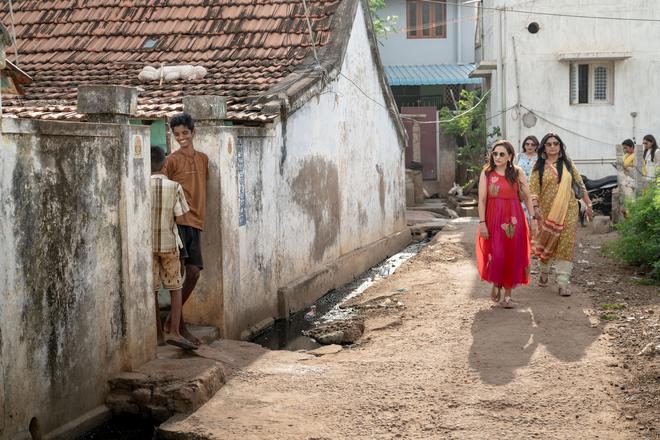
Taking Chettinad’s story forward via art, Amar believes “walking through the lanes of Chettinad is like having an opportunity to have an intimate conversation with the past”. “Many regions like Chettinad deserve recognition. I have been fortunate to have visited Chettinad numerous times over the last decade, and there’s a personality that this place carries. The art, architecture, and culture that you witness around you is a definition of timelessness.”
Having said that, Amar admits to being witness to a lot of the region’s rich architecture of the past disappearing. “It’s either because the heritage homes were sold or demolished completely. With my passion projects like the book, I believe art is a way through which I can make Chettinad an exciting topic of conversation.”
For Chennai-based Lakshmi Olagammai, a 25-year-old artist born in Karaikudi, the entire region serves as inspiration for her art. At the upcoming Chettinad Heritage and Cultural Festival, her hand-drawn illustrations of mansions and monuments will be digitised and converted into postcards for guests.
“While I grew up in Madras, I spent most of my holidays and festivals in Karaikudi. Chettiar women knew a lot about handicraft. From neatly drawn kolams and hand-painted pongal pots to British-styled cross-stitch and traditional hand-woven baskets, I have seen my grandmother make these and I learned them through my early years,” says Lakshmi, who illustrated postcards for the maiden edition of the festival last year too.
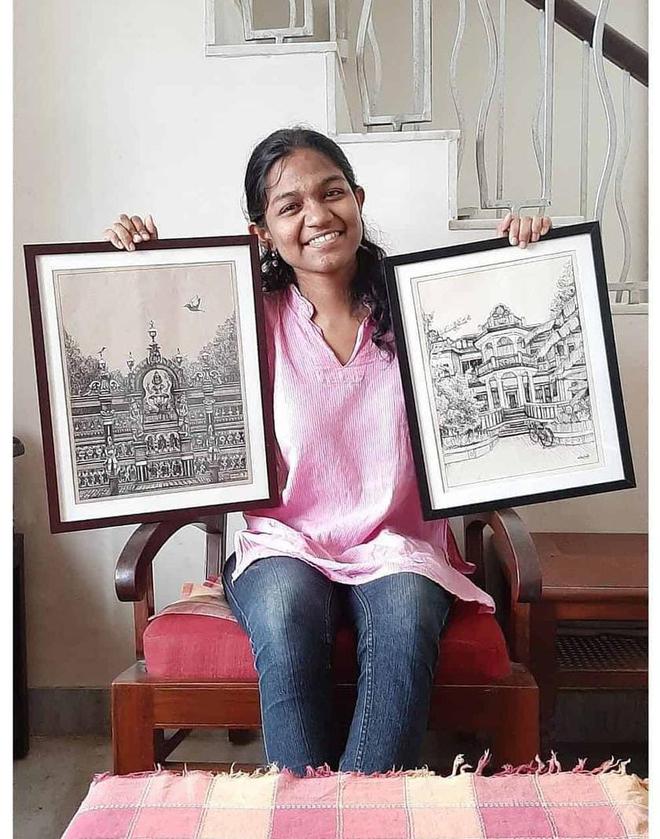
Dabbling in various artistic mediums such as game art, book illustrations, acrylic, pen and ink styles, etc, she says, “I’ve always had an eye for architectural perspectives. I decided to weave that through my artistic abilities and the Chettinad project was born in 2018. I displayed my work during the first annual Chettinad Sandhai in Chennai and all my illustrations sold out. Since then, I have been working in association with The Bangala to recreate and capture as many mansions as possible in this art form.” But what drew her to Chettinad? “The architectural planning that happened centuries back with no form of technology in this region has both utility and opulence. Each mansion has a different artistic sense – with paintings and mirrors in every room and even murals on the walls. Our ceilings are intricate and the pillars or doorways have beautiful carvings.”
On set
Yacob George, general manager at The Bangala explains how cinema shoots add ₹20 lakh a day to the region’s revenue. Dulquer Salman’s recent Onam release King of Kotha was shot across Chettinad for over 90 days. “We had the opportunity to film at several exotic and heritage-rich locations in Karaikudi such as the heritage mansions, and the bustling Karaikudi market that provided an authentic backdrop for some lively scenes. The many live locations and streets were perfectly apt for our film language,” says Vinoth CJ, business lead - South Movies at Zee Studios.
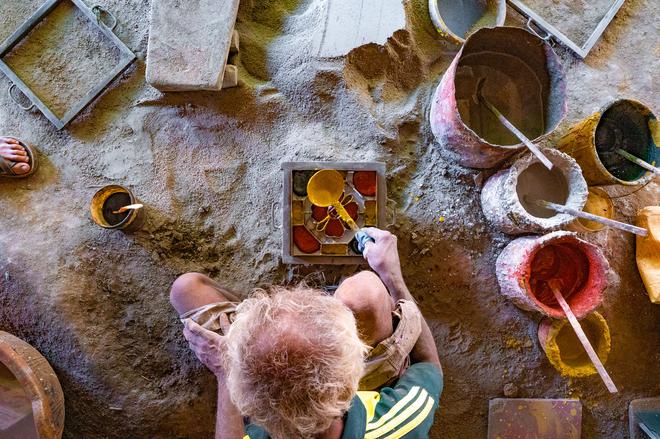
The decision to choose Karaikudi to shoot King of Kotha was because of its rich heritage, picturesque setups, and shooting-friendly locations. “The region allowed us to capture its cultural essence and showcase prominent landmarks, adding authenticity to the filming process.”
Narayanan Valliappan, CEO of film production and distribution company Raaj Kamal Films International, recounts their experience shooting parts of Vikram in Karaikudi. “We shot at a palatial home at Kadiapatti. It fit the bill of being quaint and this home had abundant character. The houses in the area have a scale and bring a sense of character and earthiness unmatched by any other location,” he says of the team’s time there shooting Vijay Sethupathi’s portions of the film.
Flavours of the region
And then, the food. If elaborate feasts curated by Meenakshi Meiyappan are the forte of The Bangala, The Vaadhyar’s House is known for Chettinad short eats, and outfits such as Alagu Snacks and Soundaram’s Chettinad Sweets and Snacks are popular for their traditional palagarams such as murukku, thattai and sweet thenkuzhal.
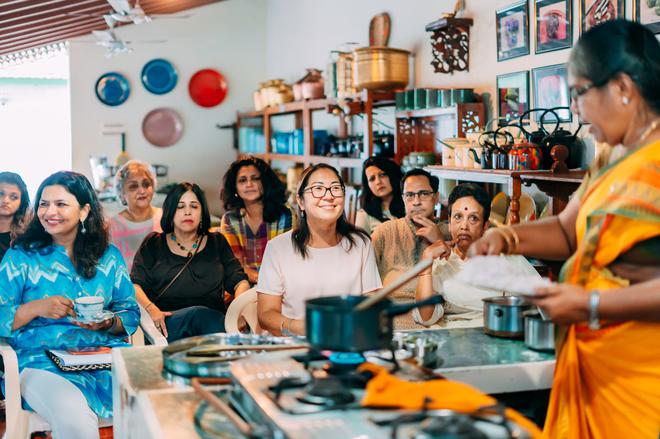
The region’s rich culinary heritage has not just been documented in books such as The Bangala Table, The Chettinad Cookbook, but culinary holidays are also popular. At the upcoming Chettinad Festival, lunch on all days will be served at the SA House in Kanadukathan, and comprise a traditional and elaborate Chettinad feast on a banana leaf. Dishes include sweet mango pachadi, tomato ketti kozhambu, banana flower kozhambu, mutton kozhambu, quail pepper masala, kandarappam, bread pudding, among other traditional delicacies.
“The dinners will be a buffet with live counters at the various venues. For the Madurai leg of the festival, a Madurai street food dinner with a folk dance performance, a Saurashtrian lunch at a traditional Saurashtrian home, and an Anglo Indian dinner have been organised,” shares Yacob.
“In the next couple of years, Chettinad will be the next big destination. Just wait and watch,” concludes Yacob. With development projects across all sectors, and perhaps even an airport at Karaikudi in the offing, Chettinad has all the ingredients of perhaps the country’s largest cultural revival project. So if you are looking for an unexplored, quaint holiday, you know where to head.







